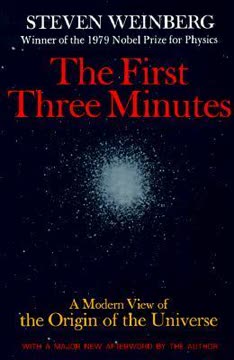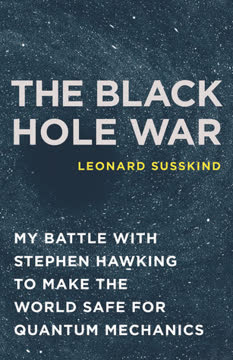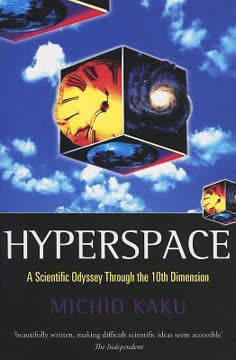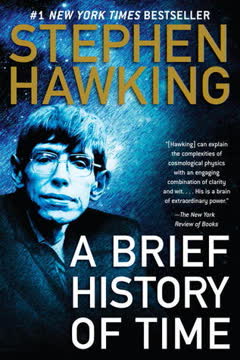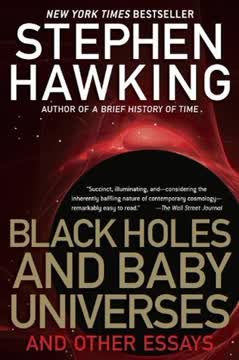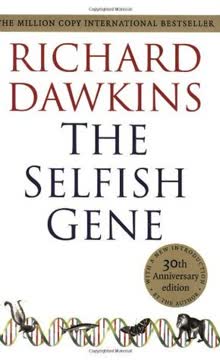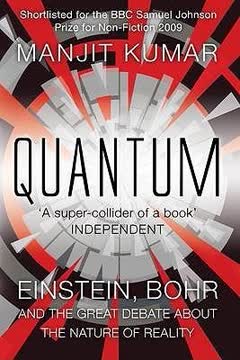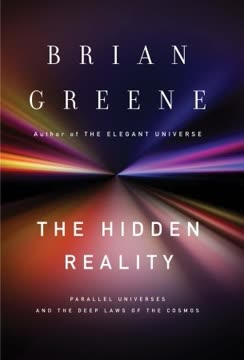つの重要なポイント
1. 宇宙は無から生じることができ、伝統的な創造の概念に挑戦する
無は常に何かを生み出す、たとえ一瞬であっても。
「無」の再定義: 量子物理学において、空間は真に空ではない。それは粒子と反粒子が自発的に現れたり消えたりする動的な環境である。これは「無からは何も生じない」という哲学的な概念に挑戦する。
創造者なしの創造: 物理法則は物質、エネルギー、さらには時空そのものの自発的な創造を許す。これは外部の力や神の介入を必要としない。むしろ、これは量子力学と一般相対性理論の自然な結果である。
- 仮想粒子は量子真空から存在することができる
- 閉じた宇宙の総エネルギーがゼロである場合、それは自発的に生じることができる
- インフレーション理論は、微小な量子揺らぎが我々の観測可能な宇宙に拡大する方法を説明する
2. 量子揺らぎとインフレーションが我々の宇宙の起源と構造を説明する
量子揺らぎは、インフレーションによって凍結され、その後、密度揺らぎとして現れ、我々が見るすべてを生み出す!
宇宙の膨張: インフレーション理論は、初期の宇宙が空間のエネルギーによって指数関数的に膨張した期間を提案する。これにより、観測可能な宇宙の平坦性と均一性などのいくつかの宇宙論的な謎が解決される。
構造の種: インフレーション中の量子揺らぎがすべての宇宙構造の種となった。これらのエネルギー密度の微小な変動は宇宙規模に拡大し、最終的に銀河、星、惑星の形成につながった。
- インフレーションは、宇宙が大規模で平坦で均一に見える理由を説明する
- 宇宙背景放射はこれらの原始的な揺らぎの証拠を提供する
- この理論は量子の世界と宇宙の大規模構造を結びつける
3. ダークエネルギーが宇宙を支配し、その膨張を加速させる
我々は非常に特別な時代に生きている...観測的に我々が非常に特別な時代に生きていることを確認できる唯一の時代に!
予期せぬ発見: 1990年代後半の遠方の超新星の観測により、宇宙の膨張が加速していることが明らかになった。これにより、重力に対抗する神秘的な力であるダークエネルギーが発見された。
宇宙の構成: ダークエネルギーは宇宙のエネルギー内容の約70%を占め、ダークマターがさらに25%を占める。目に見え触れることができる通常の物質は宇宙の5%未満を占める。
- ダークエネルギーの性質は物理学の最大の謎の一つである
- その発見は宇宙の過去と未来に対する我々の理解を根本的に変えた
- アインシュタインが提案し、その後放棄した宇宙定数がダークエネルギーを説明するかもしれない
4. 加速膨張により観測可能な宇宙は遠い未来に消える
無が我々に向かって衝突コースを進んでいる!
宇宙の地平線: 宇宙が加速的に膨張するにつれて、遠方の銀河は我々に対して光速を超えて後退するようになる。これにより、それらは我々の視界から消え、観測可能な宇宙はますます空になる。
宇宙論の終焉: 遠い未来には、天文学者はビッグバンや宇宙の膨張の証拠を観測することができなくなる。宇宙背景放射は検出できないほど微弱になり、我々の局所群外のすべての銀河は宇宙の地平線を越えて消えてしまう。
- 約2兆年後には、現在観測可能な宇宙の大部分が観測不可能になる
- 未来の文明は静的で永遠の宇宙の誤ったイメージを持つかもしれない
- これは宇宙発見のための我々の現在の時代の特権的な性質を強調する
5. 複数の宇宙が存在し、それぞれが異なる物理法則を持つ可能性がある
我々の宇宙は、広大な多元宇宙の海に埋もれた一滴の涙のようなものである。
多元宇宙仮説: 現代物理学のさまざまな理論、特に弦理論や永遠のインフレーションは、複数の宇宙の存在を示唆している。この「多元宇宙」の各宇宙は、異なる基本定数や物理法則を持つ可能性がある。
微調整の意味: 我々の宇宙が生命に適しているように見えるのは、多数の宇宙が存在するためかもしれない。このシナリオでは、我々は自然に我々の存在に適した宇宙にいることになるが、無数の他の宇宙は住むことができない。
- 弦理論は広大な「風景」の可能性のある宇宙を示唆する
- 永遠のインフレーションは新しい宇宙が絶えず創造されていることを提案する
- 多元宇宙の概念は、唯一の目的を持って設計された宇宙の考えに挑戦する
6. 人間原理は我々の宇宙の特性が唯一無二でも必然でもないことを示唆する
もし我々がすべて星の塵であるならば、インフレーションが起こったならば、我々はすべて、文字通り、量子の無から生じたことも真実である。
選択効果: 人間原理は、我々の宇宙の観測された特性が我々のような観測者の存在の要件によって制約されていると主張する。これは宇宙がなぜそうであるかを説明するものではないが、我々が観測する可能性のある特性の範囲を制限する。
環境科学: 多元宇宙のシナリオでは、多くの自然の基本定数は必然的な特徴ではなく環境的な偶然である可能性がある。これにより、これらの定数が特定の値を持つ理由を説明することから、多元宇宙全体で異なる値の確率分布を理解することに焦点が移る。
- 物理定数の生命に対する微調整は観測選択効果である可能性がある
- この原理は多元宇宙の存在を証明するものではないが、その中での我々の位置を理解するための枠組みを提供する
- それは宇宙が人間の存在のために特別に設計されたという考えに挑戦する
7. 哲学や神学ではなく科学が我々の存在について最良の答えを提供する
この質問の最終的な仲裁者は、希望、欲望、啓示、または純粋な思考からではなく、自然の探求から来るだろう。
経験的アプローチ: 存在の本質についての哲学的および神学的な議論は何千年も続いてきたが、科学的探求は宇宙の理解において驚異的な進歩を遂げている。この進歩は観測証拠と検証可能な理論に基づいている。
直感の限界: 現実の本質についての我々の常識的な概念は、しばしば科学的発見によって矛盾する。量子の世界と時空の性質は我々の日常の経験に挑戦し、「何か」と「無」の概念を更新する必要がある。
- 科学はわずか1世紀で我々の宇宙の理解を革命的に変えた
- 哲学的議論はしばしば自然についての時代遅れまたは誤った仮定に依存する
- 科学的方法は人類の知識の境界を押し広げ続けている
8. 宇宙の未来は無への回帰かもしれない
「なぜ何かが存在するのか?」という質問は、単に「長くは存在しないだろう」ということになる。
宇宙のサイクル: いくつかの理論は、我々の宇宙が最終的に「無」の状態に戻る可能性があることを示唆している。これは物質の崩壊、ダークエネルギーの支配、または異なる真空状態への移行によって起こる可能性がある。
一時的な存在: 「何か」の存在は、より大きな宇宙サイクルの中で一時的な状態である可能性がある。これは現在の宇宙の状態が特別または永続的であるという暗黙の仮定に挑戦する。
- 陽子の崩壊と宇宙の熱的死は最大エントロピーの状態に導く可能性がある
- いくつかの弦理論モデルは、我々の宇宙が不安定で最終的に崩壊することを提案する
- 我々の宇宙の一時的な性質は、現在の存在の貴重さを強調する
最終更新日:
FAQ
What's "A Universe from Nothing" about?
- Exploration of Cosmology: The book delves into the current state of cosmology, exploring the origins and future of the universe.
- Concept of Nothingness: It examines the idea that the universe could arise from "nothing," challenging traditional philosophical and theological views.
- Scientific Advances: Krauss discusses groundbreaking scientific advances that have reshaped our understanding of the universe's beginnings.
- Interdisciplinary Approach: The book bridges the gap between science and popular culture, making complex ideas accessible to a broader audience.
Why should I read "A Universe from Nothing"?
- Understanding Cosmology: It provides a comprehensive introduction to modern cosmology and the scientific principles that govern the universe.
- Challenging Perspectives: The book challenges traditional notions of creation and existence, offering a scientific perspective on these age-old questions.
- Engaging Writing: Krauss's writing is known for its clarity and wit, making complex scientific concepts engaging and understandable.
- Cultural Relevance: The book addresses the intersection of science, philosophy, and religion, making it relevant to contemporary debates on these topics.
What are the key takeaways of "A Universe from Nothing"?
- Universe from Nothing: The universe can arise from nothing due to the laws of physics, particularly quantum mechanics and general relativity.
- Role of Dark Energy: Dark energy plays a crucial role in the universe's expansion and its eventual fate.
- Flat Universe: Observations suggest that the universe is flat, which has significant implications for its origin and evolution.
- Scientific Inquiry: The book emphasizes the importance of scientific inquiry and evidence-based understanding of the universe.
How does Lawrence Krauss explain the concept of "nothing" in the book?
- Quantum Fluctuations: Krauss explains that quantum fluctuations allow particles to appear and disappear, suggesting that "nothing" is unstable.
- Empty Space: He describes empty space as a dynamic entity with energy, challenging the traditional notion of "nothing."
- Cosmological Constant: The book discusses how the cosmological constant represents energy in empty space, contributing to the universe's expansion.
- Scientific Perspective: Krauss uses scientific principles to redefine "nothing," moving away from philosophical and theological definitions.
What is the significance of dark energy in "A Universe from Nothing"?
- Dominant Force: Dark energy is the dominant force driving the accelerated expansion of the universe.
- Cosmological Constant: It is often associated with the cosmological constant, a concept introduced by Einstein.
- Implications for the Universe: Dark energy's presence suggests that the universe will continue to expand, leading to a cold, dark future.
- Scientific Mystery: Despite its significance, dark energy remains one of the biggest mysteries in cosmology, with its nature and origin still largely unknown.
How does Krauss address the question of "something from nothing"?
- Scientific Explanation: Krauss argues that the universe can arise from nothing due to the laws of physics, particularly quantum mechanics.
- Inflation Theory: The book discusses how inflation theory explains the rapid expansion of the universe from a small, dense state.
- Quantum Mechanics: Quantum fluctuations allow for the spontaneous creation of particles, suggesting that "nothing" is inherently unstable.
- Challenging Traditional Views: Krauss challenges the philosophical and theological notion that creation requires a creator.
What role does the concept of a flat universe play in the book?
- Observational Evidence: Krauss presents evidence that the universe is flat, which has significant implications for its origin and evolution.
- Inflation Theory: A flat universe is consistent with the predictions of inflation theory, which describes the rapid expansion of the early universe.
- Energy Balance: In a flat universe, the total gravitational energy is zero, supporting the idea that the universe could arise from nothing.
- Scientific Consensus: The flatness of the universe is a key piece of evidence supporting the current cosmological model.
What are the best quotes from "A Universe from Nothing" and what do they mean?
- "Forget Jesus, the stars died so you could be born." This quote emphasizes the scientific perspective that our existence is a result of natural processes, not divine intervention.
- "The universe is the way it is, whether we like it or not." Krauss highlights the importance of accepting scientific evidence, even if it challenges our beliefs.
- "Nothing is not nothing. Nothing is something." This quote encapsulates the book's central theme that "nothing" is a dynamic and complex concept in physics.
- "We live at a very special time... the only time when we can observationally verify that we live at a very special time!" Krauss underscores the unique opportunity we have to study the universe's expansion and understand its origins.
How does Krauss use scientific principles to challenge traditional philosophical and theological views?
- Redefining Nothing: Krauss uses quantum mechanics and general relativity to redefine "nothing," moving away from traditional philosophical definitions.
- Evidence-Based Arguments: The book emphasizes the importance of evidence-based understanding, challenging the need for a creator in explaining the universe's origin.
- Scientific Inquiry: Krauss advocates for scientific inquiry as the best method for understanding the universe, rather than relying on philosophical or theological speculation.
- Interdisciplinary Approach: By bridging science and popular culture, Krauss makes complex scientific ideas accessible, encouraging readers to question traditional beliefs.
What is the role of quantum mechanics in "A Universe from Nothing"?
- Quantum Fluctuations: Quantum mechanics allows for the spontaneous creation of particles, suggesting that "nothing" is inherently unstable.
- Virtual Particles: The book discusses how virtual particles can appear and disappear in empty space, challenging traditional notions of "nothing."
- Inflation Theory: Quantum mechanics plays a crucial role in inflation theory, which describes the rapid expansion of the early universe.
- Scientific Explanation: Krauss uses quantum mechanics to provide a scientific explanation for the universe's origin, challenging philosophical and theological views.
How does "A Universe from Nothing" address the future of the universe?
- Dark Energy's Role: The book discusses how dark energy will continue to drive the universe's expansion, leading to a cold, dark future.
- Disappearance of Evidence: Krauss explains that in the distant future, evidence of the Big Bang and the universe's expansion will disappear, making it difficult for future civilizations to understand the universe's origins.
- Bleak Outlook: The book presents a bleak outlook for the universe's future, with galaxies receding beyond the observable horizon and stars eventually burning out.
- Scientific Perspective: Despite the bleak future, Krauss emphasizes the importance of understanding the universe's evolution through scientific inquiry.
What is the significance of the multiverse concept in "A Universe from Nothing"?
- Multiple Universes: The multiverse concept suggests that our universe is one of many, each with different physical laws and constants.
- Anthropic Principle: Krauss discusses how the multiverse concept supports the anthropic principle, which explains why our universe is suitable for life.
- Challenging Uniqueness: The multiverse challenges the idea that our universe is unique, suggesting that its properties may be the result of chance.
- Scientific Exploration: The book explores the multiverse as a scientific concept, encouraging readers to consider the broader implications for our understanding of the universe.
レビュー
本書『無からの宇宙』は、宇宙論と宇宙の起源に関する興味深いアイデアを紹介し、無から何かが生じる方法を説明している。レビュアーたちは、クラウスのわかりやすい文体と複雑な概念の魅力的な説明を称賛している。多くの読者は本書を刺激的だと感じたが、一部の人々はその反宗教的な立場や時折の不明瞭さを批判した。読者は最近の科学的発見や理論について学ぶことを評価したが、技術的な側面に苦労することもあった。全体として、本書は現代の宇宙論を探求する上で、情報豊かで興味深いものと見なされているが、時折の欠点もある。
Similar Books
